|
|
|
Sort Order |
|
|
|
Items / Page
|
|
|
|
|
|
|
| Srl | Item |
| 1 |
ID:
178571
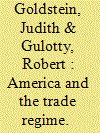

|
|
|
|
|
| Summary/Abstract |
The era of American leadership in the multilateral trading regime has ended. This paper argues that this current antipathy to trade is unsurprising: support for US leadership of the regime has always rested on a precarious balance among domestic interests. To overcome a historic bias in favor of home market production, American leaders created incentives for exporters to organize while creating roadblocks for import-competing firms and their employees. The dominance of the exporters’ voice had a significant influence on the policies the US pursued in the design and execution of the global trade regime. Most importantly, the absence of labor's voice undermined the prospect for “embedded liberalism” and instead resulted in an anemic system of adjustment for job loss at home and limited support for worker interests within the regime. While policymakers’ decision to shift power away from potential “veto” groups may have been necessary for US leadership of the Liberal International Order, this institutional design undermined a robust response to the economic dislocation thought to be a result of globalization. The result was a fracturing of the coalition in support of American leadership in the GATT/WTO regime.
|
|
|
|
|
|
|
|
|
|
|
|
|
|
|
|
| 2 |
ID:
178578
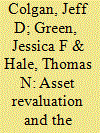

|
|
|
|
|
| Summary/Abstract |
Whereas scholars have typically modeled climate change as a global collective action challenge, we offer a dynamic theory of climate politics based on the present and future revaluation of assets. Climate politics can be understood as a contest between owners of assets that accelerate climate change, such as fossil fuel plants, and owners of assets vulnerable to climate change, such as coastal property. To date, obstruction by “climate-forcing” asset holders has been a large barrier to effective climate policy. But as climate change and decarbonization policies proceed, holders of both climate-forcing and “climate-vulnerable” assets stand to lose some or even all of their assets' value over time, and with them, the basis of their political power. This dynamic contest between opposing interests is likely to intensify in many sites of political contestation, from the subnational to transnational levels. As it does so, climate politics will become increasingly existential, potentially reshaping political alignments within and across countries. Such shifts may further undermine the Liberal International Order (LIO); as countries develop pro-climate policies at different speeds and magnitudes, they will have incentives to diverge from existing arrangements over trade and economic integration.
|
|
|
|
|
|
|
|
|
|
|
|
|
|
|
|
| 3 |
ID:
178565
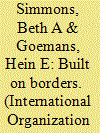

|
|
|
|
|
| Summary/Abstract |
The Liberal International Order is in crisis. While the symptoms are clear to many, the deep roots of this crisis remain obscured. We propose that the Liberal International Order is in tension with the older Sovereign Territorial Order, which is founded on territoriality and borders to create group identities, the territorial state, and the modern international system. The Liberal International Order, in contrast, privileges universality at the expense of groups and group rights. A recognition of this fundamental tension makes it possible to see that some crises that were thought to be unconnected have a common cause: the neglect of the coordinating power of borders. We sketch out new research agendas to show how this tension manifests itself in a broad range of phenomena of interest.
|
|
|
|
|
|
|
|
|
|
|
|
|
|
|
|
| 4 |
ID:
178549
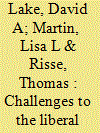

|
|
|
|
|
| Summary/Abstract |
As International Organization commemorates its seventy-fifth anniversary, the Liberal International Order (LIO) that authors in this journal have long analyzed is under challenge, perhaps as never before. The articles in this issue explore the nature of these challenges by examining how the Westphalian order and the LIO have co-constituted one another over time; how both political and economic dynamics internal to the LIO threaten its core aspects; and how external threats combine with these internal dynamics to render the LIO more fragile than ever before. This introduction begins by defining and clarifying what is “liberal,” “international,” and “orderly” about the LIO. It then discusses some central challenges to the LIO, illustrated by the contributors to this issue as well as other sources. Finally, we reflect on the analytical lessons we have learned—or should learn—as the study of the LIO, represented by scholarship in International Organization, has sometimes overlooked or marginalized dynamics that now appear central to the functioning, and dysfunction, of the order itself.
|
|
|
|
|
|
|
|
|
|
|
|
|
|
|
|
| 5 |
ID:
178550
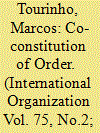

|
|
|
|
|
| Summary/Abstract |
The idea of liberal international order as a world order is understood to be constituted as a result of disproportionate Anglo-American influences. This is in line with much of international relations (IR) theory, which typically characterizes the emergence of order as resulting from the diffusion or imposition of norms and institutions from the world's centers of power. This article argues otherwise, its premise being that the international order founded on sovereign equal nation-states was co-constituted as well by the influence of relatively weak actors through decentralized processes of contestation over core international norms. Drawing on international relations, history, and law, this article outlines a framework to interpret the actions and mechanisms by which supposedly weak actors shaped international order. It concisely traces the constitution of order as based on its fundamental norms and assesses the implications of the argument for the current crisis of liberal order, as well as IR theory more broadly, laying out a research agenda for the future.
|
|
|
|
|
|
|
|
|
|
|
|
|
|
|
|
| 6 |
ID:
178552
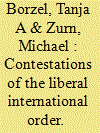

|
|
|
|
|
| Summary/Abstract |
The 1990s saw a systemic shift from the liberal post–World War II international order of liberal multilateralism (LIO I) to a post–Cold War international order of postnational liberalism (LIO II). LIO II has not been only rule-based but has openly pursued a liberal social purpose with a significant amount of authority beyond the nation-state. While postnational liberal institutions helped increase overall well-being globally, they were criticized for using double standards and institutionalizing state inequality. We argue that these institutional features of the postnational LIO II led to legitimation problems, which explain both the current wave of contestations and the strategies chosen by different contestants. We develop our argument first by mapping the growing liberal intrusiveness of international institutions. Second, we demonstrate the increased level and variety of contestations in international security and international refugee law. We show that increased liberal intrusiveness has led to a variety of contestation strategies, the choice of which is affected by the preference of a contestant regarding postnational liberalism and its power within the contested institution.
|
|
|
|
|
|
|
|
|
|
|
|
|
|
|
|
| 7 |
ID:
178580
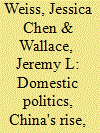

|
|
|
|
|
| Summary/Abstract |
With the future of liberal internationalism in question, how will China's growing power and influence reshape world politics? We argue that views of the Liberal International Order (LIO) as integrative and resilient have been too optimistic for two reasons. First, China's ability to profit from within the system has shaken the domestic consensus in the United States on preserving the existing LIO. Second, features of Chinese Communist Party rule chafe against many of the fundamental principles of the LIO, but could coexist with a return to Westphalian principles and markets that are embedded in domestic systems of control. How, then, do authoritarian states like China pick and choose how to engage with key institutions and norms within the LIO? We propose a framework that highlights two domestic variables—centrality and heterogeneity—and their implications for China's international behavior. We illustrate the framework with examples from China's approach to climate change, trade and exchange rates, Internet governance, territorial sovereignty, arms control, and humanitarian intervention. Finally, we conclude by considering what alternative versions of international order might emerge as China's influence grows.
|
|
|
|
|
|
|
|
|
|
|
|
|
|
|
|
| 8 |
ID:
178573
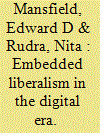

|
|
|
|
|
| Summary/Abstract |
In recent years, the volume and intensity of attacks on globalization have been steadily rising. It is frequently argued that the antiglobalization backlash stems from strains that have been placed on the compromise of embedded liberalism. We argue that existing research underemphasizes how technological change and the digital revolution have contributed to these strains. Global value chains facilitated by the digital revolution have linked technology in advanced industrial countries to low-cost labor in developing countries, precipitating distributional losses for low-skilled labor in the industrial world. Further, the digital revolution has led to regulatory challenges involving both capital and labor. We argue that, as a result, governments face both mounting opposition to globalization and heightened difficulty in supporting the programs and policies necessary to buffer the adverse domestic effects of globalization and maintain support for embedded liberalism.
|
|
|
|
|
|
|
|
|
|
|
|
|
|
|
|
| 9 |
ID:
178562
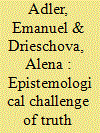

|
|
|
|
|
| Summary/Abstract |
Truth-subversion practices, which populist leaders utilize for political domination, are a significant source of current pressure on the Liberal International Order (LIO). Truth-subversion practices include false speak (flagrant lying to subvert the concept of facts), double speak (intentional internal contradictions in speech to erode reason), and flooding (the emission of many messages into the public domain to create confusion). Aiming to destroy liberal truth ideals and practices, truth subversion weakens epistemological security; that is, the experience of orderliness and safety that results from people's and institutions’ shared understandings of their common-sense reality. It privileges baseless claims over fact-based opinions, thus creating communities of the like-minded between which communication becomes impossible. Truth subversion challenges the LIO's three key institutions: democracy, markets, and multilateralism. If truth-subversion practices prevail, societal polarization, inaccurate information, and emotional inflaming strain democracy and human rights protections. Markets that depend for their functioning on accurate information can falter, and multilateralism that relies on communication and reasoned consensus can decay. International relations (IR) scholarship has recognized knowledge production practices as a key feature underlying the LIO, but has not yet identified challenges to those practices as a threat for the LIO. We discuss what the discipline can do to alleviate its blind spots.
|
|
|
|
|
|
|
|
|
|
|
|
|
|
|
|
| 10 |
ID:
178567
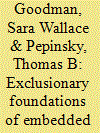

|
|
|
|
|
| Summary/Abstract |
Analyses of embedded liberalism have focused overwhelmingly on trade in goods and capital, to the exclusion of migration. We argue that much as capital controls were essential components of the embedded liberal compromise, so too were restrictions on the democratic and social rights of labor migrants. Generous welfare programs in labor-receiving countries thrived alongside inclusionary immigration policies, but this balanced arrangement was only tenable if migrants were politically excluded in their destination countries. That is, embedded liberalism abroad rested on exclusionary political foundations at home. In bringing together the IPE literature on the “globalization trilemma” with the comparative politics of citizenship, we provide a novel account of how embedded liberalism worked politically, with implications for current debates about the fate of the liberal order in a time of populist resurgence.
|
|
|
|
|
|
|
|
|
|
|
|
|
|
|
|
| 11 |
ID:
178560
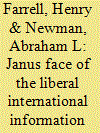

|
|
|
|
|
| Summary/Abstract |
Scholars and policymakers long believed that norms of global information openness and private-sector governance helped to sustain and promote liberalism. These norms are being increasingly contested within liberal democracies. In this article, we argue that a key source of debate over the Liberal International Information Order (LIIO), a sub-order of the Liberal International Order (LIO), is generated internally by “self-undermining feedback effects,” that is, mechanisms through which institutional arrangements undermine their own political conditions of survival over time. Empirically, we demonstrate how global governance of the Internet, transnational disinformation campaigns, and domestic information governance interact to sow the seeds of this contention. In particular, illiberal states converted norms of openness into a vector of attack, unsettling political bargains in liberal states concerning the LIIO. More generally, we set out a broader research agenda to show how the international relations discipline might better understand institutional change as well as the informational aspects of the current crisis in the LIO.
|
|
|
|
|
|
|
|
|
|
|
|
|
|
|
|
| 12 |
ID:
178556
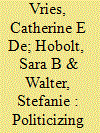

|
|
|
|
|
| Summary/Abstract |
International institutions are increasingly being challenged by domestic opposition and nationalist political forces. Yet, levels of politicization differ significantly across countries facing the same international authority as well as within countries over time. This raises the question of when and why the mass public poses a challenge to international cooperation. In this article, we develop a theoretical framework for understanding the nature and implications of politicization of international cooperation, outlining three scope conditions: the nature of public contestation, the activities of political entrepreneurs, and the permissiveness of political opportunity structures. By empirically examining these scope conditions, we demonstrate that politicization can have both stabilizing and destabilizing effects on international cooperation. Highlighting the systemic implications of politicization for international cooperation has important implications for international relations scholarship. Although international organizations may face challenges, they also have ways of being remarkably resilient.
|
|
|
|
|
|
|
|
|
|
|
|
|
|
|
|
| 13 |
ID:
178569


|
|
|
|
|
| Summary/Abstract |
A populist backlash to globalization has ushered in nationalist governments and challenged core features of the Liberal International Order. Although startling in scope and urgency, the populist wave has been developing in declining regions of wealthy countries for some time. Trade, offshoring, and automation have steadily reduced the number of available jobs and the wages of industrial workers since at least the 1970s. The decline in manufacturing employment initiated the deterioration of social and economic conditions in affected communities, exacerbating inequalities between depressed rural areas and small cities and towns, on the one hand, and thriving cities, on the other. The global financial crisis of 2008 catalyzed these divisions, as communities already in decline suffered deeper and longer economic downturns than metropolitan areas, where superstar knowledge, technology, and service-oriented firms agglomerate. We document many of these trends across the United States and Europe, and demonstrate that populist support is strongest in communities that experienced long-term economic and social decline. Institutional differences in labor markets and electoral rules across developed democracies may explain some of the variation in populists’ electoral success. Renewed support for the Liberal International Order may require a rejuvenation of distressed communities and a reduction of stark regional inequalities.
|
|
|
|
|
|
|
|
|
|
|
|
|
|
|
|
| 14 |
ID:
178568


|
|
|
|
|
| Summary/Abstract |
Formal racial equality is a key aspect of the current Liberal International Order (LIO). It is subject to two main challenges: resurgent racial nationalism and substantive racial inequality. Combining work in International Relations with interdisciplinary studies on race, I submit that these challenges are the latest iteration of struggles between two transnational coalitions over the LIO's central racial provisions, which I call racial diversity regimes (RDRs). The traditional coalition has historically favored RDRs based on racial inequality and racial nationalism. The transformative coalition has favored RDRs based on racial equality and nonracial nationalism. I illustrate the argument by tracing the development of the liberal order's RDR as a function of intercoalitional struggles from one based on racial nationalism and inequality in 1919 to the current regime based on nonracial nationalism and limited equality. Today, racial nationalists belong to the traditional coalition and critics of racial inequality are part of the transformative coalition. The stakes of their struggles are high because they will determine whether we will live in a more racist or a more antiracist world. This article articulates a comprehensive framework that places race at the heart of the liberal order, offers the novel concept of “embedded racism” to capture how sovereignty shields domestic racism from foreign interference, and proposes an agenda for mainstream International Relations that takes race seriously.
|
|
|
|
|
|
|
|
|
|
|
|
|
|
|
|
| 15 |
ID:
178570


|
|
|
|
|
| Summary/Abstract |
The rise of top-heavy inequality—earnings concentration in a very thin layer of elites—calls into question our understanding of the distributional effects of the Liberal International Order. Far more people lose from globalization, and fewer gain, than traditional economic models suggest. We review three modern trade theories (neo-Heckscher-Ohlin-Stolper-Samuelson or H-O-S-S, new new trade theory, and economic geography) that each arrive at the conclusion of top-heavy inequality by introducing some form of unit heterogeneity—an assumption that the actors we once treated as identical actually differ from one another in important ways. Heterogeneity allows the gains from globalization to concentrate in a narrow segment of workers with superlative talents, extraordinarily productive firms, or heavily agglomerated cities. An analysis of European voting data shows that shocks from trade and migration elicit populist opposition only where the top 1 percent have gained the most. With few politically feasible alternatives to protectionism, most notably the failure of democracies to redistribute income, our analysis predicts a persistence of public support for antiglobalization parties, especially those on the Right.
|
|
|
|
|
|
|
|
|
|
|
|
|
|
|
|
| 16 |
ID:
178579
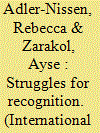

|
|
|
|
|
| Summary/Abstract |
The Liberal International Order (LIO) is currently being undermined not only by states such as Russia but also by voters in the West. We argue that both veins of discontent are driven by resentment toward the LIO's status hierarchy, rather than simply by economic grievances. Approaching discontent historically and sociologically, we show that there are two strains of recognition struggles against the LIO: one in the core of the West, driven by populist politicians and their voters, and one on the semiperiphery, fueled by competitively authoritarian governments and their supporters. At this particular moment in history, these struggles are digitally, ideologically, and organizationally interconnected in their criticism of LIO institutions, amplifying each other. The LIO is thus being hollowed out from within at a time when it is also facing some of its greatest external challenges.
|
|
|
|
|
|
|
|
|
|
|
|
|
|
|
|
|
|
|
|
|